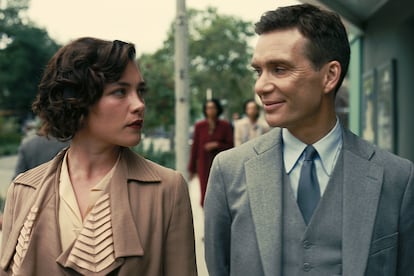Did Oppenheimer really try to poison his teacher?
Christopher Nolan’s film presents a fictionalized version of a story that reminds us the complex nature of Oppenheimer during his youth

In Oppenheimer, Christopher Nolan’s Oscar nominated film based on the extensive biography about Robert Oppenheimer, written by journalists Kai Bird and Martin J. Sherwin, the director presents a little-known fact about the father of the atomic bomb. In the opening scenes of the film, Nolan presents the character as a young, anxious student working with experimental physicist Patrick Blackett at Cambridge University. After being mocked by Blackett in one of his classes, the then-student takes one of the teacher’s apples and injects it with cyanide. He later regrets his decision and narrowly prevents visiting scientist Niels Bohr from eating it.
The scene helps showcase Oppenheimer’s complicated personality, but it is possible that such an event didn’t actually occur, according to the scientist’s biography that inspired the film.
What really happened?
In the biography American Prometheus: The Triumph and Tragedy of J. Robert Oppenheimer, Bird and Sherwin present a detailed version of the scientist, using testimonies from his family and several of his peers. As The New York Times review of the book states, “It succeeds in deeply fathoming his most damaging, self-contradictory behavior.” This is achieved by including stories like “the poison incident.”
According to the biographers, during his time in Cambridge, Robert’s emotional state was deteriorating. He was homesick, anxious, and depressed. “Among other complaints, he talked about his troubled relationship with his head tutor, Patrick Blackett,” the journalists say. Robert admired Blackett and sought his approval, but the tutor wanted him to do more laboratory work, something Oppenheimer wasn’t good at. This heightened his anxiety and led him to take extreme action. “Consumed by feelings of inadequacy and intense jealousy, he ‘poisoned’ an apple with chemicals from the laboratory and left it on Blackett’s desk.”
Oppenheimer’s friend, biologist Jeffries Wyman, had doubts about what happened: “Whether or not this was an imaginary apple, or a real apple, whatever it was, it was an act of jealousy.”
Blackett did not eat the apple (and contrary to what the movie shows, Niels Bohr wasn’t involved). Francis Fergusson, one of Robert’s closest friends, recalled the incident differently: “He had kind of poisoned the head tutor. It seemed incredible, but that was what he said. And he had actually used cyanide or something somewhere. And fortunately, the tutor discovered it,” which had serious consequences for Oppenheimer.
According to the biographers, it is more likely that Robert had laced the apple with something that would have merely made Blackett sick, not kill him (which would have resulted in attempted murder). However, it was still grounds for expulsion from Cambridge.
The university authorities informed Oppenheimer’s parents about the incident. Julius Oppenheimer, his father, lobbied the university not to press criminal charges, and after negotiations, it was agreed that the young scientist would be put on probation. Furthermore, Oppenheimer agreed to have regular sessions with a prominent psychiatrist in London. The biography states that “a Freudian psychoanalyst diagnosed dementia praecox, a now archaic label for symptoms associated with schizophrenia. He concluded that Oppenheimer was a hopeless case and that ‘further analysis would do more harm than good.’”
Fergusson described a meeting he had with Oppenheimer after the scientist finished a session with the psychiatrist. “He looked crazy at that time… I saw him standing on the corner waiting for me, with his hat on one side of his head, looking absolutely weird… He was sort of standing around, looking like he might run or do something drastic.”
According to Fergusson, Oppenheimer thought that the psychoanalysis “was too stupid to follow him and that he knew more about his troubles than the doctor did, which was probably true.”
In a later incident, Oppenheimer locked his mother in her hotel room and left. She then insisted that he see a French psychoanalyst who said that Robert was suffering a “crise morale” associated with “sexual frustration,” and he recommended that he have sex and take “a course of aphrodisiacs.”
Oppenheimer would later have a violent incident involving Fergusson. After his friend announced that he had proposed to his girlfriend, Robert attacked him, grabbing him by the neck. The biographers suggest that the thought of losing Fergusson as a friend (something that happened to him before) was “just too much for him at that point.” Robert later apologized to Fergusson. During the spring of 1926, he started seeing another analyst and learned more about psychoanalysis.
In March 1926, Robert traveled with three friends, Frederick Bernheim, John Edsall, and Jeffries Wyman. Oppenheimer had to return earlier to deal with the fallout of the so-called poisoning at Cambridge, and he talked about the ordeal with his friends. “I never knew,” Wyman recalled, “whether it was real or imaginary.” Edsall said, “[Robert] spoke of it with a sense of reality that Jeffries and I both felt that this must be some kind of hallucination on his part.”
When asked if he really believed the story, Fergusson said, “Yes, I do. I do. His father then had to engineer the authorities of Cambridge about Robert’s attempted murder.” Oppenheimer later returned to the university, having improved his condition.
Sign up for our weekly newsletter to get more English-language news coverage from EL PAÍS USA Edition
Tu suscripción se está usando en otro dispositivo
¿Quieres añadir otro usuario a tu suscripción?
Si continúas leyendo en este dispositivo, no se podrá leer en el otro.
FlechaTu suscripción se está usando en otro dispositivo y solo puedes acceder a EL PAÍS desde un dispositivo a la vez.
Si quieres compartir tu cuenta, cambia tu suscripción a la modalidad Premium, así podrás añadir otro usuario. Cada uno accederá con su propia cuenta de email, lo que os permitirá personalizar vuestra experiencia en EL PAÍS.
¿Tienes una suscripción de empresa? Accede aquí para contratar más cuentas.
En el caso de no saber quién está usando tu cuenta, te recomendamos cambiar tu contraseña aquí.
Si decides continuar compartiendo tu cuenta, este mensaje se mostrará en tu dispositivo y en el de la otra persona que está usando tu cuenta de forma indefinida, afectando a tu experiencia de lectura. Puedes consultar aquí los términos y condiciones de la suscripción digital.









































